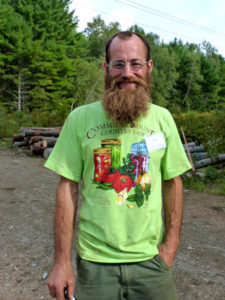 |
| Eli Berry. English photo. |
By Holli Cederholm
A woodlot, as Eli Berry sees it, is part and parcel of any Maine farm.
“I’ve never seen the woodlot on a farm to be separate from a farm,” says Berry. “Woodlots are farmers’ winter crops, or have been … I think that heating is so parallel to eating, you know it’s BTUs, it’s energy. There’s not much difference between what heats from inside and what heats from outside.”
Seventeen years ago – after graduating from Bowdoin College and leaving the state to work and travel – Berry returned to Washington, Maine, and focused on an 80-acre parcel of land purchased by his grandfather. Berry grew up in Bowdoinham, but has watched the Washington parcel transform over his lifetime – clearings transitioning into forest and, under his management, back again. When Berry assumed stewardship of the land, he assessed its viability with an eye toward working with the landscape.
Berry says, “The most responsible thing is to look at it and see what needs to happen without damaging it… To look at what work is undone, what work never got finished, what wasn’t finished right.” This brought him to the woods.
Berry spent five years using low-impact methods to reclaim open spaces, for buildings, fields and gardens. “I was getting 5 cords of wood out with a dog and wheelbarrow,” he says. He began selling firewood and lumber, and continues to do so through selective harvest. Berry compares this process to thinning carrots in a garden, except over a much longer time frame.
His own woodlot led Berry to become a longtime volunteer with MOFGA and the organization’s Low Impact Forestry (LIF) group.
“The real lead-in was trying to make sense of my own woodlot,” he says. “I was looking for a community of people who were also struggling with making a woodlot make sense without clearcutting.”
At the time, the LIF group consisted mostly of people with equal experience sharing information with each other. However, Berry notes, they quickly morphed into an educational resource for the community at large – developing a protocol to answer questions and creating a curriculum for the annual LIF workshops.
Through the years Berry has been a constant voice that the farm and the woodlot need to be integrated. “One of the biggest jobs of LIF is to remind people that the revolution of the food economy is incomplete without thinking about fuel and building materials,” he says.
Berry notes that Maine has a “crazy imbalance” in resource use. We have one of the highest percentages of home heating fuel use in the country while also having the highest percentage (nearly 90 percent) of forested land of any state. Berry thinks that the public perception of forestry needs to shift – from thinking of forestry as Plum Creek, to envisioning someone with a pruning saw doing a job analogous to thinning carrots.
He hopes the work of MOFGA and the LIF group can help people become enlightened consumers. He stresses that, as in farming and gardening, the measure of forest health is the soil and not the product. “It’s that you can do it again next year, better. That’s the real measure.”
Berry is entering his second year as the LIF committee’s liaison to MOFGA’s board of directors. He is also on the Fair steering committee and recently joined the strategic site plan committee.
